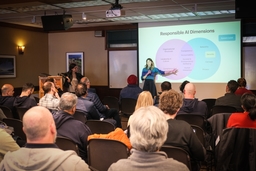Education, Skills
How AI can personalize education, change instruction, and impact inequality.
Hari Subramonyam | Learning by Creating: A Human-Centered Vision for AI in Education

In an era where AI is rapidly transforming industry and society, we offer custom-built education programs designed to meet your organization's specific needs. Our goal is to empower business leaders and decision-makers with the latest insights from AI research and the skills required to navigate this technological revolution, keeping humans at the center.

In an era where AI is rapidly transforming industry and society, we offer custom-built education programs designed to meet your organization's specific needs. Our goal is to empower business leaders and decision-makers with the latest insights from AI research and the skills required to navigate this technological revolution, keeping humans at the center.
.jpg&w=256&q=80)
We need to rethink student assessment, AI literacy, and technology’s usefulness, according to experts at the recent AI+Education Summit.
.jpg&w=1920&q=100)
We need to rethink student assessment, AI literacy, and technology’s usefulness, according to experts at the recent AI+Education Summit.

The development of digital learning infrastructure and platforms was driven by innovative AI technologies and accelerated by pandemic-imposed needs. This industry brief provides a cross-section of key AI research – at HAI and across Stanford – that are reshaping how we learn. Discover how researchers are facilitating high-quality personalized learning at scale, creating novel systems augmenting teaching and assessments, designing intentional and inclusive learning environments, and more.

The development of digital learning infrastructure and platforms was driven by innovative AI technologies and accelerated by pandemic-imposed needs. This industry brief provides a cross-section of key AI research – at HAI and across Stanford – that are reshaping how we learn. Discover how researchers are facilitating high-quality personalized learning at scale, creating novel systems augmenting teaching and assessments, designing intentional and inclusive learning environments, and more.
The Hoffman-Yee Research Grants are designed to address significant scientific, technical, or societal challenges requiring an interdisciplinary team and a bold approach.
These grants are made possible by a gift from philanthropists Reid Hoffman and Michelle Yee.
Hoffman-Yee Research Grants
The Hoffman-Yee Research Grants are designed to address significant scientific, technical, or societal challenges requiring an interdisciplinary team and a bold approach.
These grants are made possible by a gift from philanthropists Reid Hoffman and Michelle Yee.
Response to the Department of Education’s Request for Information on AI in Education

Stanford scholars respond to a federal RFI on advancing AI in education, urging policymakers to anchor their approach in proven research.

Stanford scholars respond to a federal RFI on advancing AI in education, urging policymakers to anchor their approach in proven research.
All Work Published on Education, Skills

You are invited to apply for a new executive education program offered by the Stanford Institute for Human-Centered Artificial Intelligence (HAI).
You are invited to apply for a new executive education program offered by the Stanford Institute for Human-Centered Artificial Intelligence (HAI).

Stanford HAI and Swiss National AI Institute Form Alliance to Advance Open, Human-Centered AI
Stanford, ETH Zurich, and EPFL will develop open-source foundation models that prioritize societal values over commercial interests, strengthening academia's role in shaping AI's future.
Stanford, ETH Zurich, and EPFL will develop open-source foundation models that prioritize societal values over commercial interests, strengthening academia's role in shaping AI's future.
Addressing AI-Generated Child Sexual Abuse Material: Opportunities for Educational Policy

This brief explores student misuse of AI-powered “nudify” apps to create child sexual abuse material and highlights gaps in school response and policy.
This brief explores student misuse of AI-powered “nudify” apps to create child sexual abuse material and highlights gaps in school response and policy.

Citi Begins Retraining 175,000 Employees in Working with AI: ‘Great Prompting Versus Basic Prompting to Generate Impactful Results’
Stanford HAI offers executive education programs for human-centered AI adoption in business practices.
Stanford HAI offers executive education programs for human-centered AI adoption in business practices.
Inspiring Action: Identifying the Social Sector AI Opportunity Gap

This working paper reveals the untapped potential for leveraging AI for mission-related impact.
This working paper reveals the untapped potential for leveraging AI for mission-related impact.


From immersive learning and personalized tutors to lesson plans and grading, AI is everywhere in K-12 education.
From immersive learning and personalized tutors to lesson plans and grading, AI is everywhere in K-12 education.

